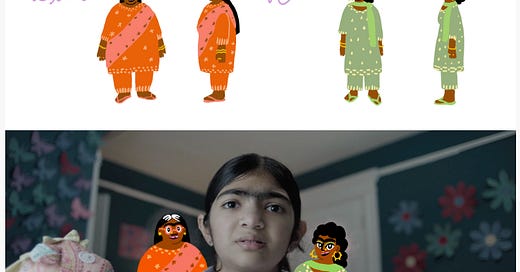Director Angbeen Saleem Gets Animated with "Billo Rani"

Brooklyn-based director and writer Angbeen Saleem is in post production for her directorial-debut short film called Billo Rani. The film is a hybrid live-action and animated short that explores a South Asian Muslim girl and her conversations with her talking unibrow. The team behind Billo Rani is currently raising funds via Seed & Spark for finish the film. We caught up with Angbeen to learn more about film.
Fann: Tell me the idea about Billo Rani? Where did it come from?
Angbeen: Billo Rani is about a young girl named Hafsa whose unibrow comes to life as two aunties after her Islamic school teacher points it out in front of the entire class. This story stems from a personal experience I had in Islamic school in South Jersey, where a teacher highlighted my unibrow in front of everyone, saying it made me look more masculine. I was mortified, although I'm not sure if anyone else in the class remembers it. I had several experiences related to body hair and appearance growing up that influenced my obsession with gender norms, beauty standards, and autonomy. One day, I realized that a unibrow resembles a line drawing of a bird, and I started imagining different ways it could come to life, which inspired the idea of the aunties.
Why are you doing this?
We are crowdfunding to raise money for the post-production of the film, which includes animation (the aunties will be animated), music, color correction, and sound design. We have already finished filming and will be premiering at the Tasveer Film Festival in October, thanks to funding from the Tasveer Film Fund. We're on a tight deadline to complete the film, especially considering the labor-intensive nature of animation, but I believe we can achieve it!
Why are stories like this important?
I often think about how tragic stories are considered more realistic, yet life is filled with a range of emotions and experiences, from anger and fear to joy and whimsy. It was important to me to create a story about South Asian Muslim characters that felt realistic (as realistic as a talking unibrow can be) while also being joyful and humorous. This story showcases a sweet relationship between a South Asian Muslim father and daughter, a dynamic rarely depicted on screen. Additionally, the film reimagines the stereotypical "aunty" character, making her more expansive than just a meddling old woman.
Why should people support?
People should support this film if they want to see more stories by South Asian Muslim women and working-class individuals who didn't have the opportunity to attend film school. If they enjoy bubbly, whimsical films about diverse characters that are still grounded in reality, this film is for them.
Why is humor in storytelling so important?
Humor in storytelling is incredibly important because it's a significant part of our lives! A deep laugh can connect us, alleviate feelings of anxiety, and help us feel in tune with the world again.
You can support Billo Rani by giving to its Seed & Spark campaign here.


